For Barbara Vernon, helping Detroit stay healthy means almost always being on the move.
It’s barely past 8:30 on a recent summer morning, and Vernon is careening between offices at the Wayne Health headquarters at 400 Mack Ave., stuffing folders, packing transparent crates and talking fast as she explains to a visitor how she and her team each day put medical care on wheels. As site lead coordinator for the Wayne Mobile Health Unit (WMHU), Vernon is responsible for keeping the program’s fleet of six Ford Transit vans and recreational vehicle outfitted to deliver health care and testing services to communities around the city, region and state.
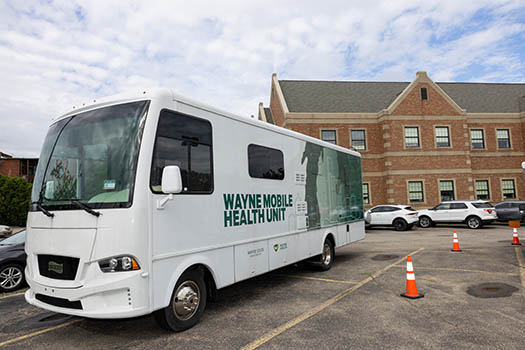
“You have to be detail-oriented,” she said while loading a pushcart full of supplies to a van headed toward an east side community center. “First thing we do in the morning is we get our vans ready. We back them up and turn the power on so that the refrigerator comes to temperature. Then we pack up our supplies, which basically are the same on each van: We have the paperwork, containers, blue pads, tablecloths, every size glove, ink, pads, printers, clipboards, your PPE, your mask, your gowns. We also have a transport cooler for our vaccines just in case we have a power issue and our power goes down for the refrigerator. This can hold its temperature for at least 24 hours. We have drink coolers. We have specimen coolers. We have everything from ponchos to hand warmers, first-aid kits, sunscreen, Kleenex, paper towels, cleaning wipes, you name it.”
Fittingly, the array of services that the mobile health units offer more than justifies Vernon’s vast stockpile.
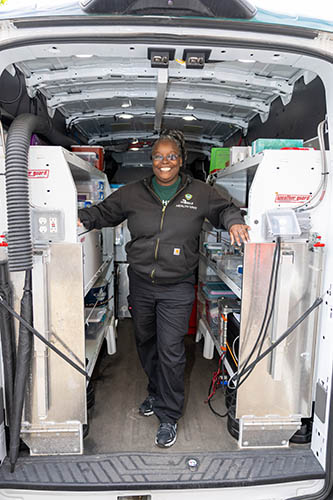
Launched in 2020 to provide COVID-19 testing, then vaccinations, to at-risk Detroiters during the pandemic, the WMHU program now visits about 36 sites weekly to offer a litany of additional services, including testing for lead exposure, HIV and hepatitis C; blood pressure screenings; flu vaccinations; sterile syringe giveaways; and the dispensing of Narcan to reverse drug overdoses. The units also provide cholesterol checks, make physician referrals and, yes, still vaccinate against COVID-19.
Manned by five- to seven-person teams that include social work professionals, nurses, university staff and student volunteers, the vehicles trek statewide to businesses, schools, strip malls and other locations to serve an array of patients. Traveling into nearly every community in Detroit and as far as the west side of the state, WMHU vans can be spotted near businesses providing vaccinations for employees, at churches checking for hypertension in seniors, near community centers to inoculate children from the coronavirus, and in numerous other locations. The units also make visits to homebound patients. As community engagement efforts go, the WMHU program, which is headed by Phillip Levy, M.D., M.P.H., associate vice president for translational science, serves as one of Wayne State University’s most practical and hands-on embodiments of its commitment to improving public health in Detroit.
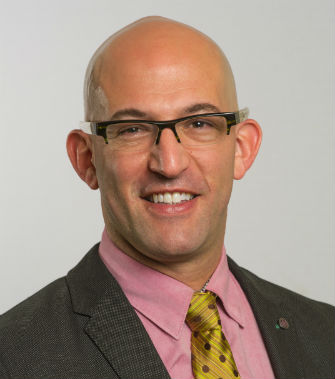
“Once the pandemic cooled and testing and vaccinations became more readily available, it made inherent sense to continue delivering health care services to where they were really needed,” Dr. Levy said. “This is especially important in underserved areas, where residents may not have access to primary care physicians, nor the transportation to get to a doctor. When data show that the quality of life varies widely from neighborhood to neighborhood, the mobile health unit can take services down to a hyperlocal level.”
Meanwhile, out on the city’s streets, members of the teams that operate the vehicles offer their own insights into the university effort to boost public health and enhance quality of life in the city. Alex Molex, who leads a team that is posted on recent day outside a shopping center on Fenkell Avenue, on the city’s west side, explained how the units address the different needs of different communities.
“This is a pretty solid, working-class community so a lot of the patients that we see here are stable, family types who just need the resources to help them make certain decisions,” he said. “Some of them haven’t been to a doctor in a long time because they’re afraid about a condition and need some education to help them get over their fear. When we go to cities like Taylor or Bloomfield Hills, there are different groups of people that need different things. Sometimes, we go to places where people are like, ‘Yeah, I go to my doctor every month. I know I have these ongoing conditions; this is just a checkpoint to make sure that I’m doing what I’m supposed to.’ Other times, we’ll go to places where people say things like, ‘I didn't even know [the mobile unit] existed in my backyard and, even though I haven’t been to a doctor in months, at least now I know what my blood pressure is. Hopefully, I can see you guys again when we come here.’ And that’s the point: We are in so many different environments that we have to gauge which communities need what services and how many times do we need to be there.”
Molex’s site is slow on this day, but he and his team are undeterred.
“Sometimes we get a lot of people; sometimes we don’t,” he said. “But the point is that we’re here to help if the community needs us. As long as people know that we’re out here and ready to help them with their medical needs, we’re doing what we need to be doing.”
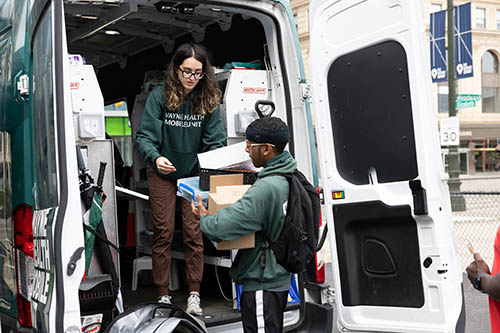
On another day, in downtown Detroit, WMHU team leader Jeren Ghoujeghi and company have their fill as they tend to patients beneath a small black tent outside of Central United Methodist Church. As a small line begins to form at the tent, one of the team members chats up a homeless man for a few seconds and then guides him to a folding chair, where she gingerly straps a blood pressure cuff onto his emaciated arm. Another team member grabs a clipboard and takes notes as another man wanders over and begins to list his numerous health ailments. At the same time, Ghoujeghi has just wrapped up a conversation with a man about helping him obtain Narcan, the nasal spray used to fight opioid overdoses.
“It’s important that Wayne State be involved in programs like this, especially being in an urban environment and with so many different types of people,” Ghoujeghi said. “It’s hard to reach and serve them all, so we’re able to go outside of the any clinic or health care center and really meet people where they are. A lot of our services are preventive, but we’re able to connect people to community resources for something that they may need. If they want to see a doctor, we can recommend them at Wayne Health to see a primary care physician. It’s a great way to provide services to people who might not have the means to reach them.”
In addition to the services offered, the WMHU program is looking to expand further. Laura Schulz, the department administrator at Wayne Health, noted that the program is gearing up to begin testing for pre-pregnancy health concerns and provide mobile obstetric services Aug. 13, having recently secured the funding, training and equipment needed to launch this effort.
“The goal is to offer preventive health screening services to all women as a way of identifying risk factors before they become a chronic disease,” she said. “It is especially important for women who are planning to become pregnant. Identifying and addressing risk factors prior to conception will help to improve the mother’s chances of having a healthy pregnancy and the birth of a healthy baby.”
But providing any service requires meticulous arrangement, which is no simple task. The WMHU program employs about 60 people, with site visits coordinated with the program’s numerous community partners. Residents must be notified — usually through word of mouth, promotional flyers and materials, social media and email — when units will be making rounds in their neighborhoods. Beyond this, each WMHU team must be paired with the right vehicle.
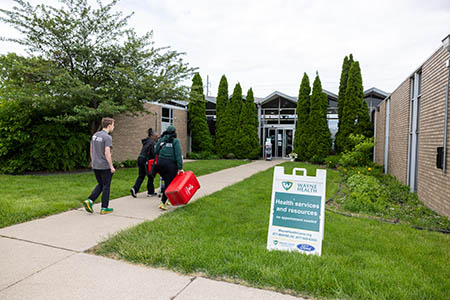
“Every team, every van, has a desk,” said Vernon. “Every team is color-coordinated so we know what supplies belong on which van: They have at least three laptops per team. Everyone has their own four blood pressure machines with the cuffs. Everyone has their own set of HIV testing supplies, sterile syringe program supplies and emergency meds. Each van also has an automated external defibrillator device. I’ll make sure to have a cart ready outside the door so that way, they can come in, sign for whatever they need to pack their van, and they’re on the road.”
A few hours later, Vernon and a WMHU team have set up at the Stoudamire Community Center on Conner Avenue on the city’s east side to serve seniors and other locals who frequent the center during the week. Today, Vernon noted, this WMHU team is hoping to perform COVID testing and vaccinations, as well health screenings that test cholesterol levels, kidney function and blood pressure while also checking for diabetes and HIV. Additionally, the WMHU program uses the center to offer mental health assessments and other services on select days through Wayne Health’s partnership with Molina Healthcare.
“With Wayne State being a university within the city that has a medical school, it’s important that we are present,” Schulz said. “Not only are we teaching — we’re out in the community doing.”
